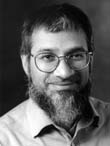Shawkat Toorawa's remarkable publishing year
By Franklin Crawford

ITHACA, N.Y. -- Publish or perish, the academic proverb goes. Certain scholars, despite demanding course loads and departmental duties, crank out a book every few years. For others the process is more protracted. In any case, it would be considered remarkable to have two books published in one academic year. The appearance of four books within one academic year ranks as a feat of heroic proportion.
But that was indeed the achievement of Shawkat Toorawa, with hard work, revisions of earlier research, coincidence -- and some swift turnarounds in publication.
Yes, publishing-wise, it was a very good academic year for Toorawa, assistant professor of Arabic literature and Islamic studies, and director of graduate studies in the Department of Near Eastern Studies. Let's start with the fall of 2004. That year saw the publication of Toorawa's "A Time Between Ashes and Roses" (Syracuse University Press), a translation and critical Arabic edition of the poems of Adonis (Ali Ahmad Said, reportedly a Nobel finalist in 2005). Born in Syria, Adonis is considered one of the greatest poets writing in Arabic and has been compared to T.S. Eliot in importance. He also is a major literary critic, anthologist, translator and public intellectual.
Also published in hardcover in 2004: "Law and Education in Medieval Islam: Studies in Memory of George Makdisi," published by the E.J.W. Gibb Memorial Trust, and co-edited by Toorawa.
Move on to 2005, and in May Toorawa's reworking of his doctoral thesis appeared in hardcover: "Ibn Abi Tahir Tayfur and Arabic Writerly Culture: A Ninth-Century Bookman in Baghdad" (RoutledgeCurzon).
Also published in May: "Arabic Literary Culture, 500-925" (Detroit: Thomson Gale), a volume in the "Dictionary of Literary Biography"(DLB)reference series, co-edited by Toorawa.
Any attempt to explain such a run gets convoluted. Toorawa began work on "Ibn Abi Tahir Tayfur" in 2001 and delays held back submission of a final manuscript until September 2004. It appeared the following spring. Meanwhile, Toorawa finished his work on Adonis in early 2004 -- it was quickly published in November of that year.
That leaves the two co-edited editions. Toorawa explains:
"I final-edited the memorial volume to George Makdisi in the summer of 2004 in Granada, where my co-editors and I were attending a workshop on Arabic literature," he said. "We had traveled through London and had physically picked up the manuscript at the publisher's offices in Oxford. We began editing it in Leuven, Belgium, and then couriered it from Granada back to the publisher. The book appeared in November 2004.
Toorawa continues:
"In March 2005, the publisher of the DLB volume decided that contributors had dragged their feet long enough and urged me and my co-editor to finalize the volume," he said. "We did so in February and by May it was out."
While it helped that the work on Adonis and Ibn Abi Tahir was based on Toorawa's past work as a graduate and doctoral student, the timing is remarkable. The Adonis book, which is "unrecognizably based on my master's thesis," he says, contains both the original Arabic and the English translation. All the tweaking and fine-tuning of his earlier scholarship led to an impressive book. But when push came to shove, a lot of work came down to good old elbow grease.
"When Syracuse University Press agreed to publish the facing Arabic, I decided to make it a critical edition, complete with apparatus," he said. "This meant typing the Arabic myself, which was very time consuming."
The academic life is a balancing act. Like so many in the profession, Toorawa has a family and is very active on campus outside the classroom. What's his method?
"During the teaching semester, I try to devote most of my time to my classes and students. I work at night, so that's when I do my writing," he said. "Research is a little more complicated. Most of it consists of reading primary material in Arabic, whether it is classical or modern. Sometimes this means using manuscripts. If it's for a book-length project, I need the continuous time afforded by the summer break to really get going. If it's a conference paper, book chapter or journal article, I can typically do the research over a semester or two. And when it comes time to write, I put on my sweats, apprise my wife and daughters of a deadline -- imposed either by me or from outside -- and try to get a draft written in three to four days. Then I spend the next few weeks fine-tuning."
Easy for him to say.
Media Contact
Get Cornell news delivered right to your inbox.
Subscribe